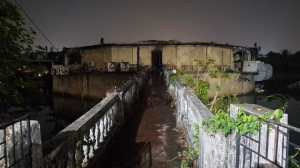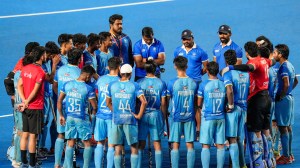Our cardinal in the Vatican
He was the last of the Indian Cardinals to leave for the Papal election. After presiding over a requiem Mass for His Holiness Pope John Paul...

He was the last of the Indian Cardinals to leave for the Papal election. After presiding over a requiem Mass for His Holiness Pope John Paul II at the Holy Name Cathedral in Fort, Mumbai, 68-year-old Cardinal Ivan Dias boarded a flight to Rome in the way he does most things—quietly and unobtrusively. The man Time magazine has described as ‘‘Asia’s best chance’’ for the Papacy, the man that bookies are placing odds on as a long shot for the post, has been curiously inaccessible to the media ever since the Pope’s demise.
‘‘I think he’s embarrassed by all this speculation that he might become Pope,’’ says his long-time friend and associate Oswald Gracias, Archbishop of Agra. ‘‘He doesn’t like making much of himself and doesn’t like a personality cult. He’s a warm, caring human being, quiet and not effusive.’’ A close family friend describes him as ‘‘a sweet, holy guy’’. His secretary of six years, Fr. Pravin Fernandes adds succinctly: ‘‘The Cardinal is very low-profile about his achievements.’’
Of those achievements there are many. During his priestly studies he distinguished himself so well, says Fr. Fernandes ‘‘that he was handpicked by Cardinal Valerian Gracias (India’s first cardinal) for higher studies at the Pontifical Academy in Rome, which trains future ambassadors for the Vatican’s diplomatic corps’’.
Cardinal Dias holds a doctorate in Canon Law from the Pontifical Lateran University, Rome. And while his fluency in 17 languages could be an apocryphal story, an associate confirms that he is proficient in about a dozen including Hindi, his mother tongue Konkani, Portuguese, Spanish, Italian, French and Korean.
Ivan Dias was born in Mumbai on April 14, 1936. His father worked with the Government of Maharashtra. Of his three brothers, one is a doctor and another is a retired Lieutenant General. Young Ivan studied at the city’s St. Stanislaus High School. He was ordained a priest in 1958, and became a bishop 24 years later.
As a member of the Vatican’s diplomatic service since 1964, he has held diplomatic posts (including some ambassadorial appointments) in several countries, among them Indonesia, Mauritius, Ghana, Togo, Benin, Korea and Albania. In November 1996, he was appointed Archbishop of Mumbai.
Despite his retiring personality, The Man-Who-Might-Be-Pope clearly has a sense of humour. On his 2001 appointment as the third cardinal in Mumbai’s history, he reportedly described the occasion as ‘‘a red-hat-trick’’ for the city—an allusion to the red headgear that is a mark of a cardinal.
If complexity and contradiction are constant companions of greatness, Cardinal Dias is an assured candidate. Although he has consistently refused to give press interviews since the Pope passed away, his letter on the Mumbai Archdiocese website observes: ‘‘Globally, the Church’s attitude to media has grown from a lack of positive involvement to acceptance, critical understanding and the possibility of evangelising it. It is with the growing recognition of the media’s potential for good, and its value as a means of personal and collective sanctification, that we have launched our archdiocesan website.’’
As an Indian, what would he bring to the Papacy? ‘‘Like the last Pope, he too would lay great stress on dialogue with other religions. After all, inter-faith dialogue is something that comes naturally to any Indian,’’ says Gracias, the Archbishop of Agra. During his tenure, the Cardinal has continued the Mumbai Archdiocese’s tradition of hosting an annual Christmas meeting of leaders of all religions. Yet, he is known to hold views that are contrary to the position taken by the Roman Catholic Church after the revolutionary Second Vatican Council of the 1960s, which declared, to put it simply, that you don’t have to be a Christian to attain salvation.
Those familiar with the history of the Church will tell you that Vatican II (in which John Paul II was a moving force) had displeased many conservatives within the Catholic Church at the time. Perhaps that is why, while listing Cardinal Dias as one of the top 20 contenders for the Papacy, the respected US-based newsweekly National Catholic Reporter says, ‘‘Dias is traditional and conservative in outlook, which separates him from the mainstream of the Indian episcopacy and theological community, known for its embrace of religious pluralism and a progressive stance on social questions.’’ Whoever wrote that is probably also aware that Cardinal Dias is believed to strongly adhere to the traditional position of the Roman Catholic Church on both abortion and homosexuality.
So does Cardinal Dias really stand a chance? Moments before leaving for Vatican City last week, Cardinal Telesphore P. Toppo of Ranchi had told The Indian Express, ‘‘Speculation does not work in the case of the Papal election. A history of 2,000 years proves that it is God’s work.’’ Adherents to fact, not faith, and well-wishers of our man from Mumbai may point out though that recent history has favoured the dark horse: After all, on the eve of the 1978 vote, who knew that in 2005 the world would be mourning the passing away of a Pole who we know as Pope John Paul II?
- 01
- 02
- 03
- 04
- 05































